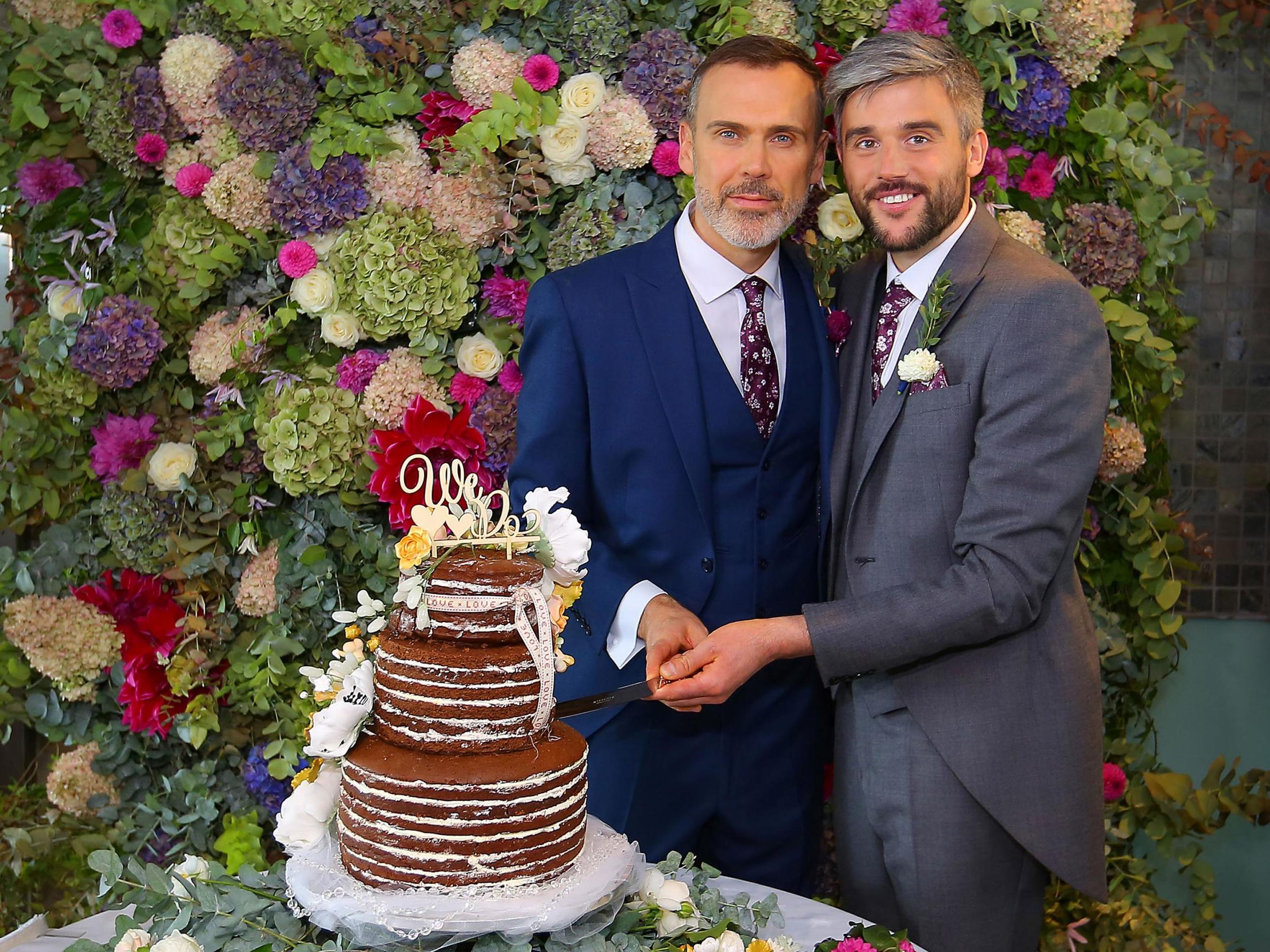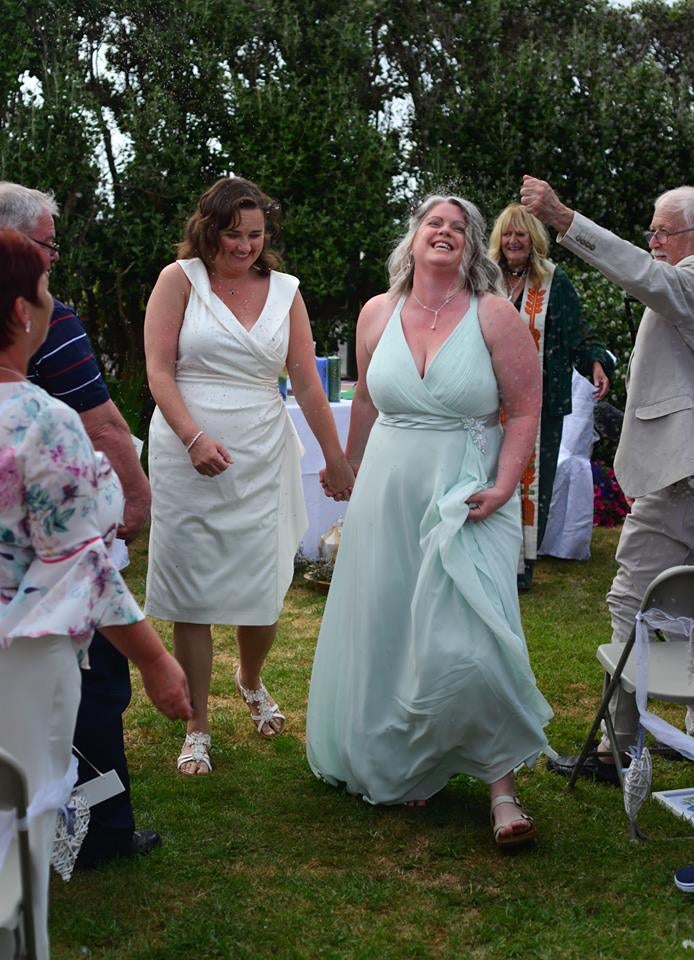‘It was the day I was proudest to be Irish’: Same-sex couples celebrate 5 years since marriage referendum
On 22 May 2015 1.2m Irish voters turned out to say yes to love. Now Sophie Gallagher speaks to couples who have married since the law changed


On 30 August 2018, Richard Lynch, 48, married the love of his life, 36-year-old Hugo Dahn, on the top floor of the Strand Hotel in Limerick. Just three years previously, this ceremony, with more than 180 family members and friends in attendance, would have been illegal in the Republic of Ireland. Even when the couple met in 2012 the prospect of being married still “felt like a dream”, explains Lynch.
“We knew we wanted to be together forever,” Lynch tells The Independent, “But growing up gay in Ireland I never thought it would happen in my lifetime.” But on 22 May 2015, Ireland voted in a historic referendum on same-sex marriage. The result, which was overwhelmingly (62 per cent) in favour of legalisation, amended the country's constitution forever.
The same day Lynch asked Dahn to marry him. “It meant all the shame I’d been carrying with me since my childhood had no more power. I felt vindicated and finally free to love the love of my life. We are finally equal in the eyes of the law.” Together the couple planned their dream wedding, complete with a vintage green car, disco ball, a rendition of Kylie Minogue’s “Flower” as their first dance and partying till the early hours. “There was not a dry eye in the house,” Lynch explains.
Just 22 years after 'homosexual acts' were decriminalised in Ireland, the result of the referendum in 2015 meant marriage was legally recognised irrespective of the sex of the partners. Although the first marriage didn’t take place until 16 November when the law came into place – as well as ratifying ceremonies that had already taken place outside of Ireland – it was a historic day.
Especially for a country that is largely religious; 78 per cent of the population identified as Roman Catholic in 2016, according to statistics from the Central Statistics Office (this is compared to 1 in 12 people in Great Britain).
That’s what a love vote does. It changes society...
Ireland was also the first country in the world to make the change through a popular vote, and one in which then prime minister, Enda Kenny, said was sending a “big message for equality” around the world. (However the law wouldn’t change across the border in Northern Ireland until 13 January 2020 when the country was finally brought into line with the rest of the UK).
Five years after that referendum, Lynch says that “marriage feels safer and more solid” and that it allowed members of the LGBTQ community in Ireland to feel recognised by society. “We are the lucky ones for sure,” he says.
Anne Blake, 41, who married her wife Jenny Blake, 37, on 30 June 2018 in Castlegregory, Kerry, agrees. “People were safer, as a result of the referendum. That’s what a love vote does. It changes society,” she says.
The Blakes hosted a two-day wedding event in 2018, made up of a small ceremony for family and then a renewal of the vows 24 hours later in front of 100 friends and family. “It was intimate and beautiful. I nearly broke down crying mid vows,” Anne says.
Anne says, like Lynch, that because she grew up with LGBTQ people being denied access to marriage, she never saw herself being wed. “I lived in a country where marriage wasn’t an option,” she says. That was until Jenny proposed in 2012 – at a time when the couple still couldn’t marry, just have a civil ceremony, which they did. But they always wished for more.
It had a very deep effect that changed the country almost at a cellular level...
“We knew no matter what the law said we wanted to get married and have the same validation as our siblings in their marriages.” When the referendum passed in 2015, Anne says it was “huge” for them, as well as for the country more widely. “It had a very deep effect that changed the country almost at a cellular level. I felt confident to hold hands in public in a way that I might have been hesitant to do before.
“It was a game changer for Ireland and turned us into this beacon of hope, love and progress at a time when there is a lot of conflict and division in the world. It is definitely the day I was proudest to be Irish.”

John Kelly, 30, from Donegal (one of the counties with the slimmest of win margins – just 33 votes in one constituency) married his husband Shane, on 17 April 2017. The couple live in a small village on the border with Northern Ireland – where the law wouldn’t change for another three years after their wedding – which made it particularly poignant. It was reported at the time that many couples living in northern Ireland were crossing the border to get married.
“Looking back now I can’t believe it has been five years already. We knew at the time that Ireland was really setting a precedent and pushing forward for our community but to compare it to the situation in Belfast only changing this year, it was huge,” he says.
Like both Blake and Lynch, Kelly says the opportunity to make his love visible to the world, and have it on an equal footing to an opposite-sex marriage, was life changing. “I don’t think opposite-sex people understand how degrading it is to not have your union, your love, seen as valid. You’re given the token gesture of a civil partnership. We wanted more.”
Five years since the referendum when 1.2million people voted yes, Ireland has an openly gay taoiseach, Leo Varadkar, in power at Oireachtas, and an end to the patchwork of marriage legislation across the emerald isle. On 22 May, although ongoing coronavirus restrictions will prevent any mass gathering or celebration in the city, Dublin Pride will be hosting a virtual party to celebrate how far the nation has come.
Join our commenting forum
Join thought-provoking conversations, follow other Independent readers and see their replies
Comments
Bookmark popover
Removed from bookmarks